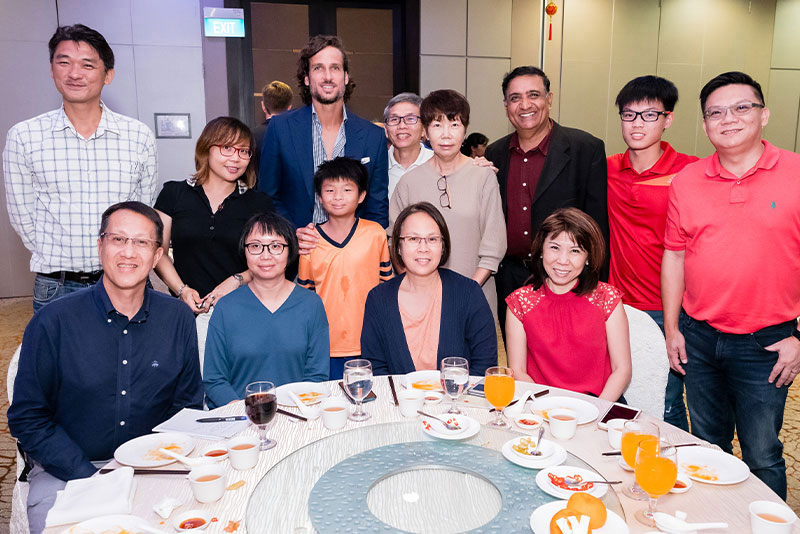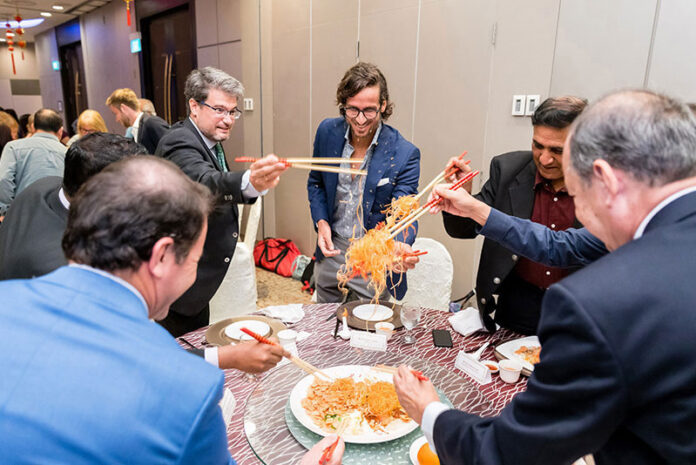López and top Spanish tennis coach Juan Manuel Esparcia share the Spanish formula for success with NUSS members through a new collaboration. By Audrina Gan
It was an evening of double celebrations as 72 NUSS members and their guests celebrated the launch of the Society’s new collaboration with Spanish tennis academy SportEd, while enjoying a sumptuous eight-course dinner to mark “Ren Ri”, also known as humankind’s birthday and observed on the seventh day of the Lunar New Year.
Speaking at the event held on 31 January 2020 at Suntec City Guild House, NUSS tennis section convenor Srinivasan Iyer said that in looking for a partner to collaborate with, it wanted one that could “deliver a different training method” to help members improve their skills. SportEd’s ability to offer a holistic experience to tennis lovers — which include giving members a taste of the Mutua Madrid Open experience through its coaching classes and ticket matches, as well as hosting tennis networking events — were key factors in the Society’s decision to partner the academy.
“This would benefit all members who are passionate about the sport and help to spur more interest amongst the young to take up tennis,” Mr Srinivasan added.
Some NUSS tennis aficionados had the rare opportunity to experience for themselves the world-class Spanish training method, through a series of tennis clinics and a two-day high-performance training camp conducted by SportEd’s co-founder Feliciano López and award-winning coach Juan Manuel Esparcia, held from 31 January to 2 February 2020 at Kent Ridge Guild House.
“Our training method is focused on adaptability and bio-ability, and we place emphasis on tactical, mental, physical and technical training. We also conduct off-court training to teach our players important values such as respect, humility and how to overcome obstacles,” said Mr Esparcia, whose coaching career has spanned more than two decades.

Mr Jose Maria Blasco Ruiz, Economic and Commercial Counsellor at the Spanish Embassy in Singapore, added that Spain, which has produced many champion athletes in basketball, swimming and tennis, has a deeply ingrained sports culture. “We have a Ministry of Education, Culture and Sport, and 42 per cent of Spanish parents play some form of sports with their kids every weekend. More than 60 per cent of Spanish families have a family member who play basketball. Through sports, we teach our kids important values, such as teamwork and leadership,” said Mr Ruiz, whose parents were basketball players, while he himself played both basketball and tennis before he left Spain for work.
Practise patience and mental strength
In order to stay at the top of the game, Mr López said a tennis player needs to have talent, self-discipline, self-determination and the ability to overcome challenges. “When I was in my 20s, I spent a lot of time at the courts to improve my skills. But when I turned 30, I began to think about what I needed to do in order to do something different. I decided to focus on my fitness and diet, as I needed to stay fit in order to challenge tennis players who are 10 to 15 years younger than me,” said the five-time Davis Cup winner and 12-time Association of Tennis Professionals title holder, who believes in doing a 30-minute warm-up before a match.
“Tennis is about strategy, but a lot of the game being played now is focused on hitting the ball. With improved technology when it comes to making tennis racquets, you can create a lot of winners out of the game, and this is something I don’t like,” added Mr López, who started playing tennis with a wooden racquet when he was just five years old.
Mr Esparcia, who helped Spanish player Guillermo García-López reach a career-high ranking of world No. 23 in 2011, advised tennis aficionados to exercise patience. “Many people want to achieve something fast, but it takes 10 to 15 years of playing before you can see some results. My advice is to stay present, enjoy the process and harness your strengths while balancing out your weaknesses.”
He also shared that it’s important for a player to manage his emotions regardless of whether he wins or loses a match. “When you win a match, you get excited and start telling your coach about the win, and you may forget to do your post-match routine. When you lose a game, you need to cool down mentally and get ready for the next match.”







